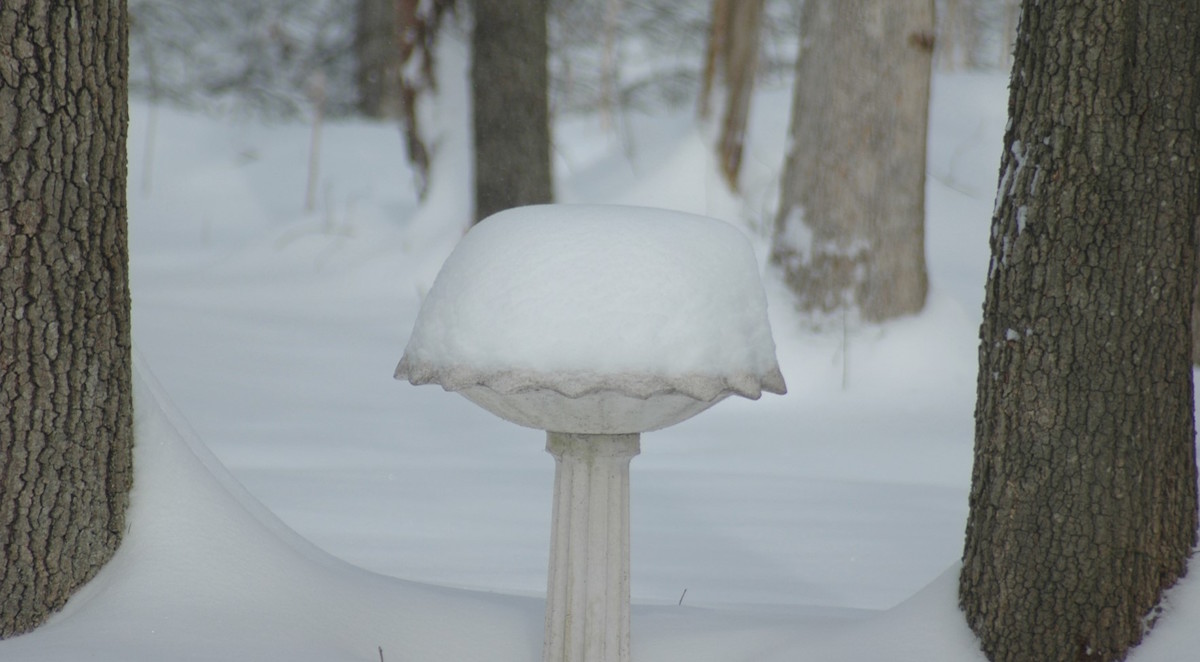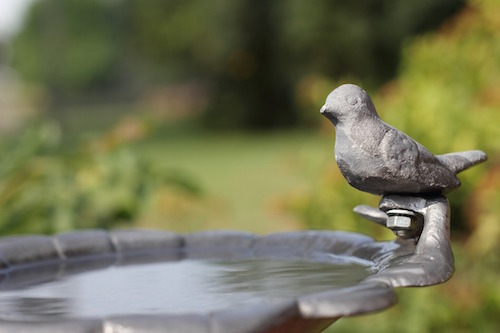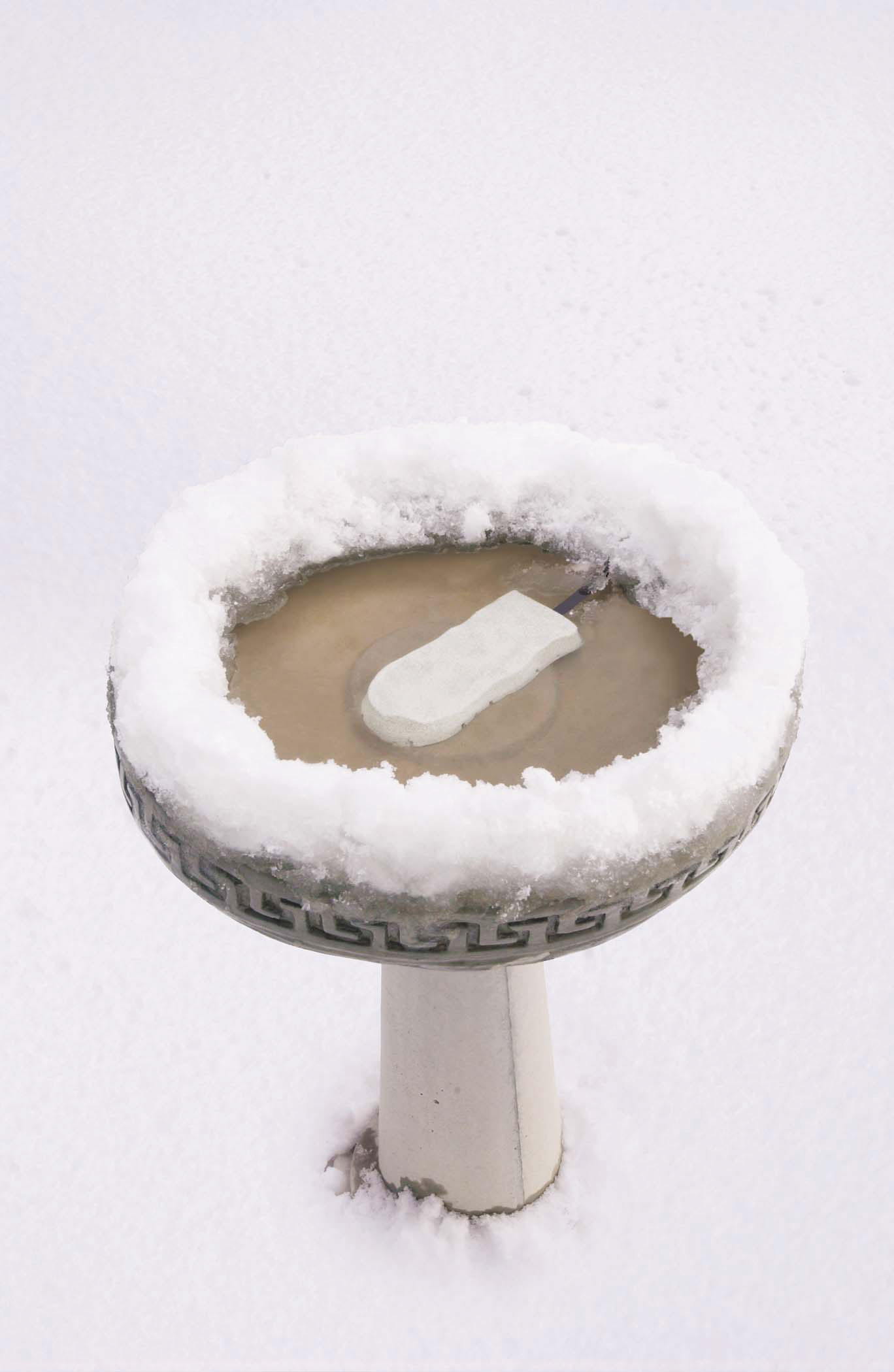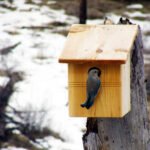
Here’s something that may surprise you: Offering birds drinking water when the temperatures dip to freezing is just as essential as offering water when the thermometer exceeds triple digits.
Yes, summer is undeniably harsh on birds but so is winter. Finding clean water to drink is extremely difficult for birds in both seasons, but winter is even worse because even though there might be snow everywhere, all the water is frozen.
So as parts of the country are suffering from cold weather (and winter isn’t even here yet!), let’s look at a few ways to winterize your birdbath to ensure your birds have fresh water when they need it most.
 Bird struggles in winter
Bird struggles in winter
We don’t have to tell you how the long cold nights and scarcity of food affects birds, but the lack of water is something that’s often overlooked.
Dehydration is a big threat to birds during winter, but water is also necessary for preening, which keeps feathers aligned. In some parts of the country, birds have to search long and hard to find water that’s not frozen over.
There’s a way to make life easier for birds: birdbaths! However, since birdbaths can freeze over when temperatures drop, it’s important to winterize them.
Birdbaths that can’t be winterized
Unfortunately, not all birdbaths can be winterized. Some birdbath will need to be stored for the winter.
Here’s a shortlist of some of the birdbaths that should be stored or covered:
- Concrete: A birdbath made from cement is highly susceptible to damage from freezing. As water freezes, it expands and that can crack a concrete basin.
- Ceramic: Ceramic baths suffer the same fate as concrete ones. Freezing water will crack a ceramic basin.
- Solar-powered birdbaths: The delicate components of a solar-powered birdbath don’t fare well in frigid temperatures and there’s no need to risk ruining the parts.
- Valuable or decorative baths: There’s also no need to risk destroying a pricey or artistic birdbath, so even if you think it might stand up to the elements, these can be stored.
You can do a few things with these baths, but it’s easiest to put them in storage. Make sure to clean them out and let them dry. For larger or set birdbaths, cover them with bags or a lid so no water can get in.
How to keep your birdbath from freezing
Location
Your birdbath placement in the shade is great for summer but bad for winter. A more suitable location is in the sun and away from the wind.
Birdbath heaters and deicers have become safer, more durable, and all-around better. This is a quick and easy solution that will keep water flowing throughout winter. There are some upfront costs, but the devices cost pennies to operate and some even turn off when the water runs out. Heaters make the water just warm enough to keep from freezing and won’t melt plastic birdbaths.
Put out fresh water each day
A more labor intensive solution is to put out a fresh batch of water each day in a birdbath you can take inside. Then, before it gets too cold, bring it inside again. Putting it out the same time each day will give the birds some routine.
Get a heated birdbath
Buying a brand new heated birdbath is another option, especially if you’re in the market for a new one. These utilize similar heaters as the ones you can add to regular birdbaths but often have more features like automatic sensors.
Be creative
Some people claim that adding a plastic bag to the bottom will absorb heat and keep the water from freezing while others recommend putting a tennis ball to keep the water moving. These aren’t substantiated, but if you’re desperate, it’s worth a shot.
Will glycerin stop a birdbath from freezing?
The answer is yes, but it doesn’t mean you should. Some people say glycerin acts as an antifreeze, but it does contain toxins. A bird can develop matted feathers or high blood sugar levels by ingesting or bathing in too much glycerin. Avoid putting chemicals of any type in your birdbath.
Other things to remember
It’s important to remember that you should treat your birdbath the same way as you do the rest of the year. Make sure it’s always clean and full of fresh water.




3 Comments
You can put the ashes in a metal bucket, then carefully a metal dish on top of the bucket and fill it with water. The hot ashes will help in keeping the water unfreeze for a while, which should be beneficial to the bird.
My cement birdbath already has water that is frozen…what can I do?
Thanks for any help.
Carol